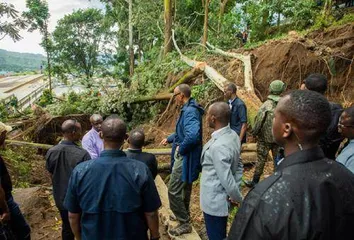The Governing Philosophy,Institutional Building and Policy Choiceof the Rwanda Patriotic Front
作者: Wang Xuejun

The sound economic andgovernance performance inRwanda has attracted wide attention in the international com- munity. A lot of research into its spe- cific policies has been done to look at the reasons behind the success of Rwanda. From the perspective of par- ty politics, its success can be equated with that of the governance model of a party-centered country. Rwanda’s ruling party, the Rwanda Patriotic Front (RPF), has led the country in achieving strong economic develop- ment by enhancing its power, strong will for development and pragmatic and flexible policy choices. The RPF’s success can shed light for latecomer countries in terms of economic devel- opment and governance.
PRESSURE, MISSION, AND RPF’SSTRONG WILL FOR DEVELOPMENT
The first impetus for the RPF to lead Rwanda in developing its econo- my comes from its strong will, which is not only caused by its survival pres- sure, but also influenced by the sense of mission at its birth.
Firstly, the RPF faced severe chal- lenges when it came to power. The Rwanda genocide in 1994, which lasted nearly 100 days, not only took alarge number of lives, but also caused a serious economic disaster. Rwanda’s GDP plunged by more than 50% that year, with per capita GDP falling from $249 the previous year to $112. The country was in desperate need of an infusion of funds for reconciliation and reconstruction, but it had neither mineral resources nor strategic im- portance and was not on the radar of Western-led international aid. From 1994 to 1996, only $800 million of the $2.2 billion promised by the West was delivered. Even with the subsequent increase in foreign aid, as a result of various efforts, it was often halted or reduced by the West on so-called “hu- man rights” grounds, which prompt- ed Rwanda to resolve to become self- reliant. Another pressure comes from within. The RPF is a political organi- zation composed mainly of Tutsi refu- gees who have been living in neigh- boring countries such as Uganda and Burundi since independence. Before ending the genocide and taking over power in 1994, the RPF had little con- tact with the country’smajority Hutu population.“The majority of the people accepted the new regime not because they truly recognized its jus- tice and legitimacy, but because they hated the previous rule. In the long term, unless there’srapid economicdevelopment and people can live a better life, peace will be most fragile”. The third pressure comes from the threat posed by long-standing Hutu rebel militias in eastern DR Congo. To deal with it, the RPF must invest sig- nificantly in improving its defence ca- pabilities. In the uncertain prospect of Western aid, it is difficult for the RPF to achieve political autonomy and secure its regime unless it achieves sustainable economic development in Rwanda. Under these three pressures, the RPF has developed a strong will to commit itself to the sustainable de- velopment of the national economy.
Secondly, the development will of the RPF came also from its strong sense of mission, which can find its source from three aspects. The first is the sense of national pride and honor existed in the history of the Kingdom of Rwanda. According to its own narrative of history, the kingdom was in expansion in the pre-colonial period when the country was rich and strong, the society was prosperous and peaceful, and the people beamed with a strong sense of pride for their nation. It was all interrupted by the invasion of European colonists and poor domestic governance after inde- pendence. The RPF is thus committed to restoring its past glory. The secondis nationalism in modern Rwanda. It was born during the colonial rule by Belgium and the decolonization strug- gle, with the goal of independence and prosperity for Rwanda, breaking the shackle of Western countries and eliminating the influence of neocolo- nialism. This is the most direct source of the RPF’s sense of mission to revi- talize and develop the national econo- my. The third is the personal ambition of RPF leader Paul Kagame. Kagame experienced a raft of disasters such as ethnic antagonism, refugee crisis, civil war and genocide in Rwanda after its independence, and developed a resolute character and the ambition to pursue national independence and peaceful development. Kagame’s per- sonal ambition is undoubtedly crucial to the RPF sense of mission as a politi- cal party.
With the process of Rwanda’s na- tional reconciliation completed and the new regime established, Kagame launched a national consultation cam- paign in the late 1990s. And in 2000, after consulting experts from China, Singapore and other countries, the Rwanda Vision 2020 was announced, which was committed to building Rwanda into a middle-income coun- try based on a knowledge-based economy. In December 2020, Kagame unveiled once again Rwanda’s Vision 2050, emphasizing that “Vision 2020 was about what we had to do in order to survive and regain our dignity. But Vision 2050 has to be about the future we choose, because we can, and because we deserve it”. The new vision aims to transform Rwanda into an upper-middle-income country by 2035 and a high-income countryby 2050. The two documents have provided guidance for the country to develop at different stages.
INSTITUTIONAL PARTY BUILDING AND THE RPF’S GROWINGSTRENGTH
The second impetus stems from the RPF’s ever-growing strength as a political party, which not only en- sures social stability, but also guaran- tees the policy making and delivery capacity of the Rwandan government. Its strength mainly comes from the institutionalization efforts in the fol- lowing three aspects.